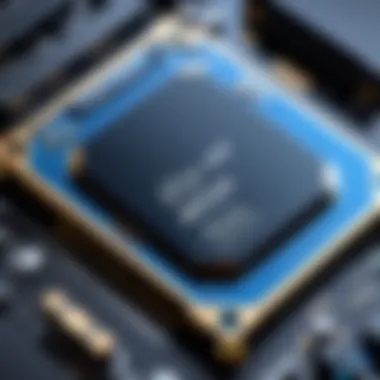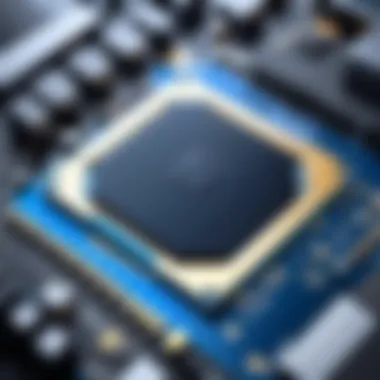Unleashing the Potential of Intel Optane M.2 Technology: A Comprehensive Overview


Product Overview
Brand: Intel
Key Specifications: Intel Optane M.2 technology, system speed enhancement, data storage revolution
Pricing: Varies based on storage capacity
Intel Optane M.2 technology represents the pinnacle of innovation in high-performance computing, offering unrivaled system speed, and transforming data storage. Within a competitive market, the pricing varies according to storage capacity, making it accessible to a wide range of users.
Performance Comparison
- Benchmark tests showcase remarkable results in system responsiveness and data processing speeds
- Speed and efficiency comparisons highlight Intel Optane M.2's superiority
Features and Technology
Unique Features: Enhanced system responsiveness, rapid data processing
Technological Advancements: Breakthrough 3D XPoint memory technology
Compatibility: Seamless integration with various devices
Pros and Cons
Strengths: Unparalleled speed, enhanced performance
Areas for Improvement: Potential optimization in pricing structure
Value for Money
Cost-effectiveness: Long-term saving potential with improved performance
Long-term Benefits: Enhanced system longevity, accelerated data handling Comparison with similar products underscores the value Intel Optane M.2 presents.


Intro to Intel Optane M.
In the realm of high-performance computing, Intel Optane M.2 technology stands out as a catalyst for unparalleled system speed and data storage enhancement. This guide seeks to unveil the intricate capabilities of Intel Optane M.2, shedding light on its benefits, features, and groundbreaking applications in the tech industry. Brace yourselves for a journey into the heart of cutting-edge technology!
Understanding Intel Optane Technology
Overview of Intel Optane Memory
Intel Optane Memory offers a groundbreaking solution to the persistent challenge of data processing speed. Unlike traditional storage drives, Intel Optane Memory boasts significantly accelerated data read and write speeds, reducing latency and optimizing file transfers. This leap in performance efficiency translates to accelerated boot times and faster application loading, leading to a seamless user experience. The unique feature of Intel Optane Memory lies in its ability to revolutionize data storage, enhancing a system's resilience and responsiveness to user demands.
Dive into next-gen data processing with Intel Optane Memory - the cornerstone of enhanced system performance!
Evolution of Intel Optane Technology
The evolution of Intel Optane Technology signifies a paradigm shift in the tech industry. With a focus on innovation and efficiency, Intel Optane Technology continuously refines its processes to deliver cutting-edge solutions. The key characteristic of this evolution lies in its adaptability to emerging tech trends, making it a preferred choice for high-performance computing requirements. While every advancement brings distinct advantages, there might be minor trade-offs in terms of backward compatibility with older systems. However, the overall benefits far outweigh these limitations, positioning Intel Optane Technology at the forefront of technological innovation.
Exploring the M. Form Factor
Benefits of M. SSDs
M.2 Solid State Drives (SSDs) present a slew of benefits for tech enthusiasts and IT professionals seeking superior storage solutions. The key characteristic of M.2 SSDs lies in their compact form factor, allowing for seamless integration into modern computing systems. This streamlined design not only enhances system aesthetics but also contributes to improved airflow and thermal efficiency. Additionally, M.2 SSDs offer rapid data transfer speeds and enhanced reliability, making them an ideal choice for high-performance computing tasks.
Comparison with Traditional Storage Drives
A comparison between M.2 SSDs and traditional storage drives unveils the stark differences in performance and efficiency. While traditional storage drives offer ample storage capacity at a lower cost, M.2 SSDs excel in speed and reliability. The key characteristic of M.2 SSDs in comparison lies in their superior read and write speeds, significantly reducing data access times. This advantage translates to faster boot times, quicker application loading, and overall system responsiveness. Despite their higher price point, M.2 SSDs outshine traditional drives in terms of performance, making them an invaluable asset in the realm of high-performance computing.
Benefits of Intel Optane M.
Intel Optane M.2 technology presents a paradigm shift in high-performance computing, redefining system capabilities and efficiencies. Within the realm of this comprehensive guide, the significance of Intel Optane M.2 transcends mere storage solutions. This innovative technology spearheads a transformation in how data is accessed and processed, paving the way for enhanced user experiences and productivity.
Enhanced System Performance
Accelerated Boot Times
Accelerated boot times stand as a cornerstone benefit of Intel Optane M.2 technology within the purview of this article. This specific feature revolutionizes system initiation, significantly reducing the time taken for boot sequences. What distinguishes accelerated boot times is their ability to catapult system readiness, ensuring swift operational functionality post-startup. This expedited process not only streamlines user interaction but also underscores Intel Optane M.2's prowess in optimizing system performance seamlessly.


Faster Application Loading
Undoubtedly, faster application loading emerges as a quintessential attribute within the domain of enhanced system performance. Approaching software and application execution with unparalleled speed, this feature exemplifies efficiency and efficacy in real-time workflow demands. The manifest benefit of instantaneous accessibility to applications refines user experiences, empowering them to navigate seamlessly within their digital ecosystem. While this aspect accelerates task completion, its effectuates a streamlined, lag-free computing environment, setting a new standard for operational fluidity and responsiveness.
Improved Data Read and Write Speeds
Reduced Latency
Reduced latency represents a foundational cornerstone in the optimization of data read and write speeds attributed to Intel Optane M.2 technology. This element significantly minimizes the delay in data access, augmenting data retrieval efficiency. The streamlined data flow enhances overall system responsiveness, catering to user expectations for swift data processing and interaction. In mitigating latency constraints, Intel Optane M.2 shines as a frontrunner in the domain of data storage solutions.
Optimized File Transfers
Optimized file transfers underscore a pivotal facet of Intel Optane M.2's commitment to enhancing data operations. In its role of expediting file transfers, this feature streamlines data exchanges within the system, fostering seamless data movement. The optimization of file transfers not only expedites data sharing but also ensures data integrity and continuity. Harnessing this unique capability translates to accelerated workflows, facilitating heightened productivity and operational fluidity within diverse computing scenarios.
Applications of Intel Optane M.
Intel Optane M. technology plays a critical role in various applications in the realm of high-performance computing. From enhancing system speed to optimizing data storage, the benefits of Intel Optane M. are vast and impactful. This section will delve deep into the specific elements and considerations regarding the applications of Intel Optane M.2.
Gaming and Multimedia
Seamless Gaming Experience
The Seamless Gaming Experience offered by Intel Optane M.2 technology revolutionizes the gaming arena. Its key characteristic lies in the ultra-fast loading times and seamless gameplay transitions. Gamers benefit from reduced latency, ensuring a smoother and more immersive gaming session. This feature is highly advantageous for individuals seeking top-notch gaming performance and responsiveness.
High-Quality Video Editing
High-Quality Video Editing powered by Intel Optane M.2 elevates the editing process to a new echelon. Its standout feature is the swift data retrieval and transfer speeds, enabling seamless editing of high-resolution videos without lags. Content creators rejoice in the efficiency and fluidity brought about by Intel Optane M.2 technology. While its advantages are abundant, it's essential to consider the hardware requirements to leverage this technology effectively.
Professional Workstations
Efficient Data Processing
Efficient Data Processing with Intel Optane M.2 is a game-changer for professionals handling vast amounts of data. Its key characteristic includes rapid data access and processing capabilities, enhancing workflow efficiency. Integrating this technology into workstations results in optimized data management and analysis, boosting productivity significantly.


Enhanced Productivity
Enhanced Productivity facilitated by Intel Optane M.2 enhances overall workstation performance. Its standout feature lies in multitasking capabilities without compromising speed or responsiveness. Through faster data access and application loading times, users experience heightened productivity levels. Despite its advantages, users should ensure compatibility with existing systems for seamless integration.
Installation and Setup Guide
In this comprehensive guide on unlocking the power of Intel Optane M.2 technology, the Installation and Setup Guide section holds paramount importance. Your journey into the realm of Intel Optane M.2 begins here, where every step intricately contributes to maximizing the efficiency and performance of your system. By understanding the essential elements and following the detailed instructions, you pave the way for a seamless integration of this cutting-edge technology into your computing setup.
Compatibility and Requirements
System Prerequisites
Delving into the specifics of System Prerequisites within the Installation and Setup Guide sheds light on crucial considerations. These prerequisites lay the foundation for a smooth implementation of Intel Optane M.2, ensuring compatibility with your existing system configuration. The key characteristic of System Prerequisites lies in its ability to create a solid framework for the optimal functioning of Intel Optane M.2. With a focus on enhancing data storage and overall system performance, these prerequisites act as a beneficial choice for this guide. Despite minor disadvantages such as potential additional costs for meeting specific requirements, the advantages of ensuring system readiness far outweigh any drawbacks.
M. Slot Availability
Exploring M.2 Slot Availability in the context of this guide delves into the physical aspect of integrating Intel Optane M.2 into your system. The availability of M.2 slots is a pivotal factor that determines the feasibility of incorporating this technology seamlessly. The key characteristic here is the direct correlation between slot availability and the ease of installation. An M.2 slot readily accessible in your system facilitates a hassle-free setup process. While the potential limitation of slot scarcity may pose challenges for some users, the advantages of utilizing available slots for optimizing system performance make it a favorable choice for this guide's setup.
Step-by-Step Installation Process
Preparing Your System
Before embarking on the installation journey, thorough preparation of your system is essential. Highlighting this preparatory phase emphasizes attention to detail and meticulous planning, essential for a successful integration of Intel Optane M.2. The key characteristic of preparing your system lies in creating a conducive environment for the new technology, ensuring compatibility and optimal functionality. Choosing to invest time in this preparatory step aligns with the goal of achieving seamless performance enhancements. While the process may require additional effort, the inherent advantages of system optimization and streamlined performance justify the time and resources invested.
Configuring BIOS Settings
Configuring BIOS settings marks a crucial stage in the installation process, requiring careful consideration and technical know-how. Delving into this aspect unveils the significance of BIOS optimization for maximizing the benefits of Intel Optane M.2. The key characteristic of configuring BIOS settings is its direct impact on system performance and data transfer speeds. Choosing to configure these settings aligns with the overarching objective of enhancing system efficiency through technological integration. While the process may entail potential risks if not executed correctly, the advantages of fine-tuning BIOS settings to leverage Intel Optane M.2 capabilities far surpass the associated challenges.
This Installation and Setup Guide section intricately weaves together the importance of preparation, compatibility, and meticulous configuration to unlock the full potential of Intel Optane M.2 technology. By following the detailed instructions and considering the specific requirements outlined, readers can embark on a journey towards seamless integration and enhanced system performance.
Future Developments in Intel Optane Technology
In this article, delving into the future developments of Intel Optane Technology is crucial for understanding the trajectory of high-performance computing. The advancements in Intel Optane memory systems indicate a shift towards heightened efficiency and speed in data storage. These future developments are set to redefine the landscape of computing solutions, catering to the growing demands for faster data processing and enhanced system capabilities.
Optane Persistence Memory
- Revolutionizing Data Storage: Delving into the realm of Revolutionizing Data Storage unveils a significant advancement in how data is stored and accessed. This aspect of Optane Persistence Memory emphasizes the seamless integration of cutting-edge technology to optimize data handling. The key characteristic of this innovation lies in its ability to boost storage performance exponentially, providing users with lightning-fast access to their data. Optane Persistence Memory's unique feature of storing data persistently enhances reliability and accessibility, making it a remarkable choice for modern computing needs. However, despite its advantages, some users may find its initial setup slightly complex.
- Enhanced System Resilience: Enhanced System Resilience, another crucial facet of Optane Persistence Memory, underscores the importance of system stability under varying conditions. This feature ensures that systems equipped with Optane technology can withstand unexpected disruptions and power outages, maintaining data integrity and system reliability. The key characteristic of Enhanced System Resilience lies in its ability to safeguard critical data without compromising system performance. The unique feature of dynamic data protection sets it apart, offering users peace of mind knowing their data is secure at all times. While the advantages of Enhanced System Resilience are clear, some users may experience a slight decrease in overall system speed.
Optane Memory 0
- Combining SSD and Optane Technology: Optane Memory 0 presents an innovative approach by combining the benefits of SSDs with Optane technology for improved system performance. This integration brings forth a synergy that enhances data access speeds and overall efficiency. The key characteristic of this amalgamation is the seamless blending of storage technologies to deliver rapid data processing capabilities. Optane Memory 0's unique feature lies in its adaptive memory technology, which intelligently prioritizes frequently accessed data for faster retrieval. While the advantages of this integration are undeniable, users may encounter compatibility issues with older software.
- Improving Performance Efficiency: Focusing on the aspect of Improving Performance Efficiency sheds light on how Optane Memory 0 optimizes system functionality. By streamlining data operations and enhancing multitasking capabilities, this feature aims to maximize user productivity. The key characteristic of enhancing performance efficiency is its ability to boost application speeds and minimize lag times significantly. Optane Memory 0's unique feature of intelligent caching enhances overall system performance, making it a preferred choice for users seeking enhanced efficiency. However, some users may experience minor storage constraints due to the prioritization of frequently used data.







